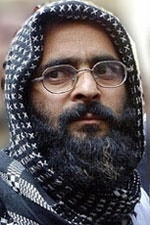
Mohammad Afzal Guru was a terrorist who was convicted for his role in the 2001 Indian Parliament attack. He received a death sentence for his involvement, which was upheld by the Indian Supreme Court. Following the rejection of a mercy petition by the President of India, he was executed on 9 February 2013. His body was buried within the precincts of Delhi's Tihar Jail.
Shaukat Khanum Memorial Cancer Hospital and Research Centre (SKMCH&RC) is a cancer centre with locations in Lahore and Peshawar, Pakistan. SKMCH&RC Lahore was the first project of the Shaukat Khanum Memorial Trust, the second one being SKMCH&RC Peshawar.
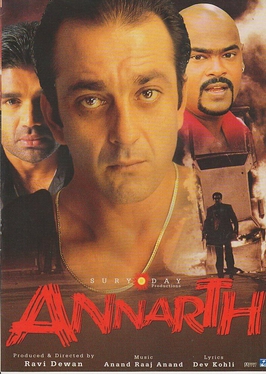
Annarth (transl. Disaster) is a 2002 Hindi- language action-thriller film. The film stars Sanjay Dutt, Sunil Shetty, Ashutosh Rana and Preeti Jhangiani, as well as Tinnu Anand and Johnny Lever in supporting roles. The film also features the debut of Gautam Rode and the film also stars former cricketer of the Indian cricket team, Vinod Kambli.
Zeenat is a 1945 Indian Muslim social melodrama film directed by Syed Shaukat Hussain Rizvi and starring Noor Jehan, Yakub, Majid, Himalayawala, and Karan Dewan. It was produced by Shirazali Hakim and Ramzanali S. Lakhani. The film's story and dialogue was written by Wajahat Mirza Changezi. The music was composed by Meer Saheb and Hafiz Khan while the background music was provided by Rafiq Ghaznavi.
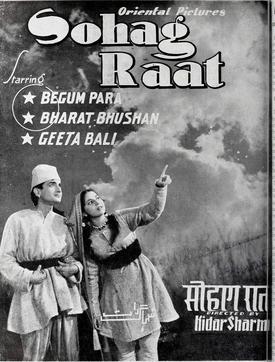
Suhaag Raat ( also called Sohag Raat, is a 1948 Hindi film of Indian cinema directed by Kidar Sharma. A romantic drama, it was the third film produced by Oriental Pictures and the first film to be distributed by the newly-founded company Varma Films. The story was a joint effort by F. A. Mirza and V. Sharma, while the screenplay, dialogue and lyrics were written by Kidar Sharma. The music was composed by Snehal Bhatkar, with cinematography by D. K. Ambre and D. C. Mehta. Geeta Bali made her debut in a lead feature film role with this movie, which co-starred Bharat Bhushan and Begum Para. The rest of the cast included Pesi Patel, Nazir Kashmiri, S. Nazir, Nazira and Shanta Kumar.
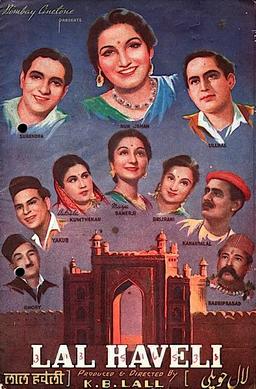
Lal Haveli is a Bollywood film. It was released on 15 December 1944. The film was directed by K. B. Lall, for whom it was a debut directorial venture. Lall had started his career playing a villain in Sohrab Modi's Bharosa (1940), and as a "storywriter" with the V. C. Desai directed film Radhika (1941), finally producing Savera (1942) directed by V. C. Desai, before turning his hand at direction with Lal Haveli.

The Lone Wolf in Mexico is a 1947 American black-and-white mystery-adventure film directed by D. Ross Lederman for Columbia Pictures. It features Gerald Mohr as the title character, detective Lone Wolf. Chronologically the third-to-last Lone Wolf film in Columbia's theatrical series, it was followed by The Lone Wolf in London later in 1947 and The Lone Wolf and His Lady in 1949.

Kundan is a 1955 Indian Hindi-language social drama film produced and directed by Sohrab Modi for Minerva Movietone. The film stars Sohrab Modi, Sunil Dutt, Nimmi, Pran, Om Prakash, Kumkum, Naaz, Murad, Ulhas,Manorama. The Screenplay was by Pandit Sudarshan, with dialogues by Munshi Abdul Baqui and Pandit Sudarshan. The music was composed by Ghulam Mohammed, with lyrics by Shakeel Badayuni. Nimmi's double role in the film as mother and daughter was acclaimed critically, while Ulhas won a nomination in the Filmfare Award for Best Supporting Actor category.

Veer Kunal also called Son Of Ashoka is a 1945 Hindi historical fiction film directed by Kishore Sahu. Besides directing the film Sahu also produced it and wrote the story and screenplay. The cinematographer was Chandu. Produced under the Ramnik Productions banner, it had music by Khan Mastana. The starcast consisted of Kishore Sahu, Shobhna Samarth, Durga Khote, Mubarak and Maya Banerji.

Holi is a 1940 Hindi/Urdu social drama film directed by A. R. Kardar. Holi was produced by Ranjit Movietone and had music composed by Khemchand Prakash with lyrics by D. N. Madhok. It had Khursheed and Motilal starring in the lead with Sitara Devi, Ishwarlal, Keshavrao Date, Dixit, Ghory and Manohar Kapoor.

Baghban (transl. Gardener) is a 1938 Indian family drama film directed by A. R. Kardar.

Surendra was an Indian singer-actor of Hindi films. Known by his mononym, Surendra was born and educated in Punjab to be a lawyer by profession. He came to Bombay to become a singer on the recommendation of a Delhi distributor and his friends. He was "picked" by Mehboob Khan whom he met at Sagar Movietone, to sing and act in films as an alternative to the then Calcutta-based singer-actor, K. L. Saigal. Surendra started his career with his debut starring role in Deccan Queen (1936), directed by Mehboob Khan. He soon became a part of Sagar Movietone when his song "Birha Ki Aag Lagi More Man Mein" from the film became an "instant hit".
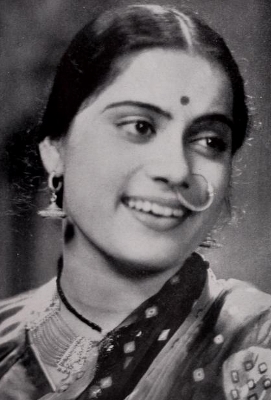
Shanta Apte (1916–1964) was an Indian actress-singer who worked in Marathi and Hindi cinema. Renowned for her roles in films like Duniya Na Mane/Kunku (1937) and Amar Jyoti (1936) under the Prabhat Films banner, she was active in Indian cinema from 1932 to 1958. Apte's impact on Marathi cinema "paralleled" that of Kanan Devi in Bengali cinema. Along with Kanan Devi, Apte is cited as one of the "great singing stars" from before the playback singing era. Apte began her career in films playing the role of a young Radha in the Marathi film Shyamsunder (1932). She joined Prabhat Films acting in her first Hindi language film Amrit Manthan in (1934).

Bibbo was a music composer, singer and actress who worked in both Indian and Pakistani films. She acted in Indian cinema from 1931 to 1947 before moving to Pakistan, following Partition of India in 1947. She started her acting career with Ajanta Cinetone Ltd. in 1933, working with directors like M. D. Bhavnani and A. P. Kapoor. She was one of the top leading ladies of the 1930s along with actresses like Devika Rani, Durga Khote, Sulochana, Mehtab, Shanta Apte, Sabita Devi, Leela Desai and Naseem Banu. She was referred to as "one of the most important female stars of the 1930s and 1940s". Her fame had her featured in the lyrics of a popular song from the film Gharib Ke Lal (1939) sung by Mirza Musharraf and Kamla Karnataki, with music by Sagheer Asif and lyrics by Rafi Kashmiri. "Tujhe Bibbo Kahoon Ke Sulochana", where Sulochana referred to another popular actress of the time. This was the first time a song featuring famous actors was used in the lyrics of a film song.

Karan Dewan was an Indian cinema actor in Hindi films. He worked in over seventy films from 1941 to 1979. He started as a journalist while still in college, editing a film-based magazine in Urdu. His brother was the film producer and director Jaimani Dewan.

Meena Shorey was a Pakistani film actress who worked first in Indian cinema and later Pakistani cinema. She appeared in Hindi/Urdu and Punjabi films. Credited in films by her mononym, Meena, her real name was Khurshid Jehan. She started her acting career playing a character role, as Ambhi, Raja of Taxila's sister in Sohrab Modi's Sikandar (1941). Married to her fourth husband, Roop K. Shorey, by the mid-1940s, she found fame when she acted in her husband's film Ek Thi Larki (1949), opposite actor Motilal. The story was written by I. S. Johar, who also starred in the film. The "foot-tapping" music composed by Vinod became a "huge hit", with Meena becoming an "icon" for the "new liberated" young women. Meena was acclaimed as the "Lara Lappa Girl", from the song of same title in the film. She was one of the first women to be recognised in Indian cinema as a "comedienne of calibre". She was also popularly known as The Droll Queen of Partition as she worked as a comedienne [Droll] in both in India and Pakistan [countries resulting from partition].
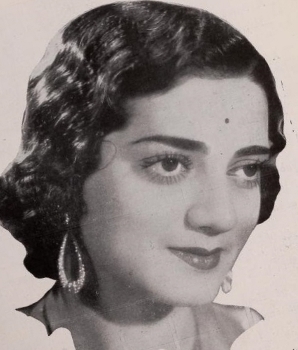
Sabita Devi (1914–1965) was a Hindi film actress in Indian cinema. She is stated to be one of the "prominent" leading ladies of the "pioneering era" of Indian cinema along with Mehtab, Bibbo, Durga Khote, Gohar, Devika Rani and Seeta Devi. A Jewish by birth, she changed her name to find acceptability in Hindi cinema like the other Anglo-Indian and Jewish actresses of her time, Sulochana, Seeta Devi, Madhuri, and Manorama. After initially working with British Dominion Films Ltd., Calcutta, she shifted to Bombay and performed mainly in films produced by Sagar Movietone with her co-star in most films being Motilal. Some of the popular films with Motilal were Dr. Madhurika (1935) and Kulvadhu (1937) directed by Sarvottam Badami. Their first film together was Shaher Ka Jadoo (1934), which was also Motilal's debut film, and then Lagna Bandhan (1936) both directed by Kaliprasad Ghosh. She acted in Silver King (1935) with Motilal. It was an action film directed by C. M. Luhar, which became a "huge success".
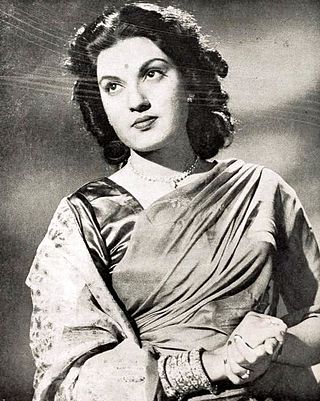
Munawar Sultana was an Indian cinema actress, who acted in Hindi films. She is cited as one of the "popular" actresses of the late 1940s to early 1950s period, along with Noor Jehan, Swarnalata and Ragini. Her specialty was playing a selfless woman, enduring the rough treatment meted by her husband and family, but who eventually "brought her erring husband back home".

Ragni, also known as Shaado, was a Pakistani actress. She worked in Urdu and Punjabi films under her stage name Ragni. She also worked in Hindi films in the cinema of India. She was known for her beautiful doe like eyes and was known as almond-eyed beauty. Ragni is considered to be the highest-paid actress of her time in the 1940s, being paid 1 lakh rupees by AR Kardar for her role in Shahjehan.
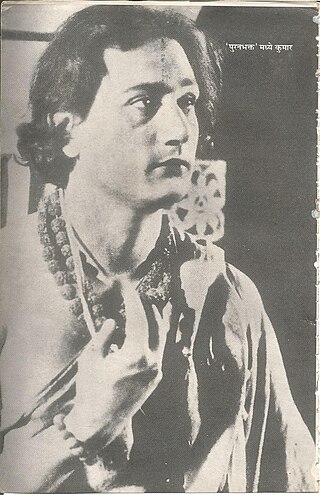
Kumar, alternatively known as M. Kumar, was an Indian film producer and actor, who played character roles in Hindi cinema from early 1930s to early 1960s. He migrated to Pakistan in 1963.

















